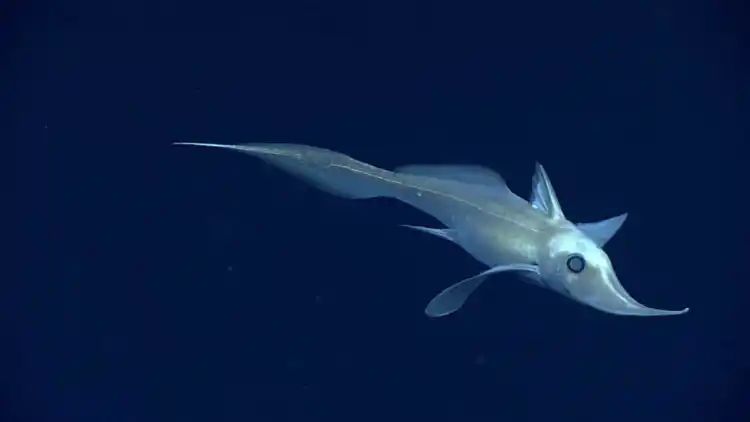Rare ‘ghost shark’, which hunts in deep ocean, found in Thailand

A new kind of chimaera, which has giant eyes, massive heads and feather-like fins was found off the coast of Thailand.
Chimaeras, which are also known as “ghost sharks”, are one kind of cartilaginous fish that are not related to the rays and sharks.
According to Live Science, Cartilaginous fish are some of the oldest fishes which are still found.
As explained by the researchers, the newly found species is one type of shortnose chimaera.
Scientists make stunning discovery of fossil belonging to 240 million-year-old ‘dragon’
The discovery was documented by the scientists in a paper published in the journal Raffles Bulletin of Zoology on March 6.
Ghost sharks live in darkness of deep sea: study
The paper emphasised that the ghost sharks are found in the deep sea’s dark waters where there is no presence of sunlight.
The chimaera is exactly found at depths below 1,640 feet near the continental slopes and ocean ridges.
The species of fish generally feed on bottom-dwelling animals like mollusks and crustaceans. Chimaera supapae is capable of growing nearly 20 inches long with broad pectoral fins.
As per the scientists, the fins of the creature assist it in moving around the sea floor. The species was found off the Andaman coast of Thailand and was deceased. It was discovered in 2018 as part of a deep-sea survey project.
“Chimaera are rare in this region of the world,” David Ebert, said lead author of the study and programme director of the Pacific Shark Research Center at San Jose State University in California while speaking to Live Science.
Nigerian woman tackles hunger through fishery
“There were only 53 known species of chimaera in the world; this makes 54,” said Ebert.
Chimaera supapae’s discovery is huge for scientists since it helps in learning more about the diversity of life present in the deep sea.
“Evolutionarily, these chimaeras are among some of the oldest lineages of fishes with the lineage going back 300-400 million years,” said Ebert.
“The discovery of new species like this chimaera tells us how little we know about the marine environment and how much is still to be explored,” he added.





